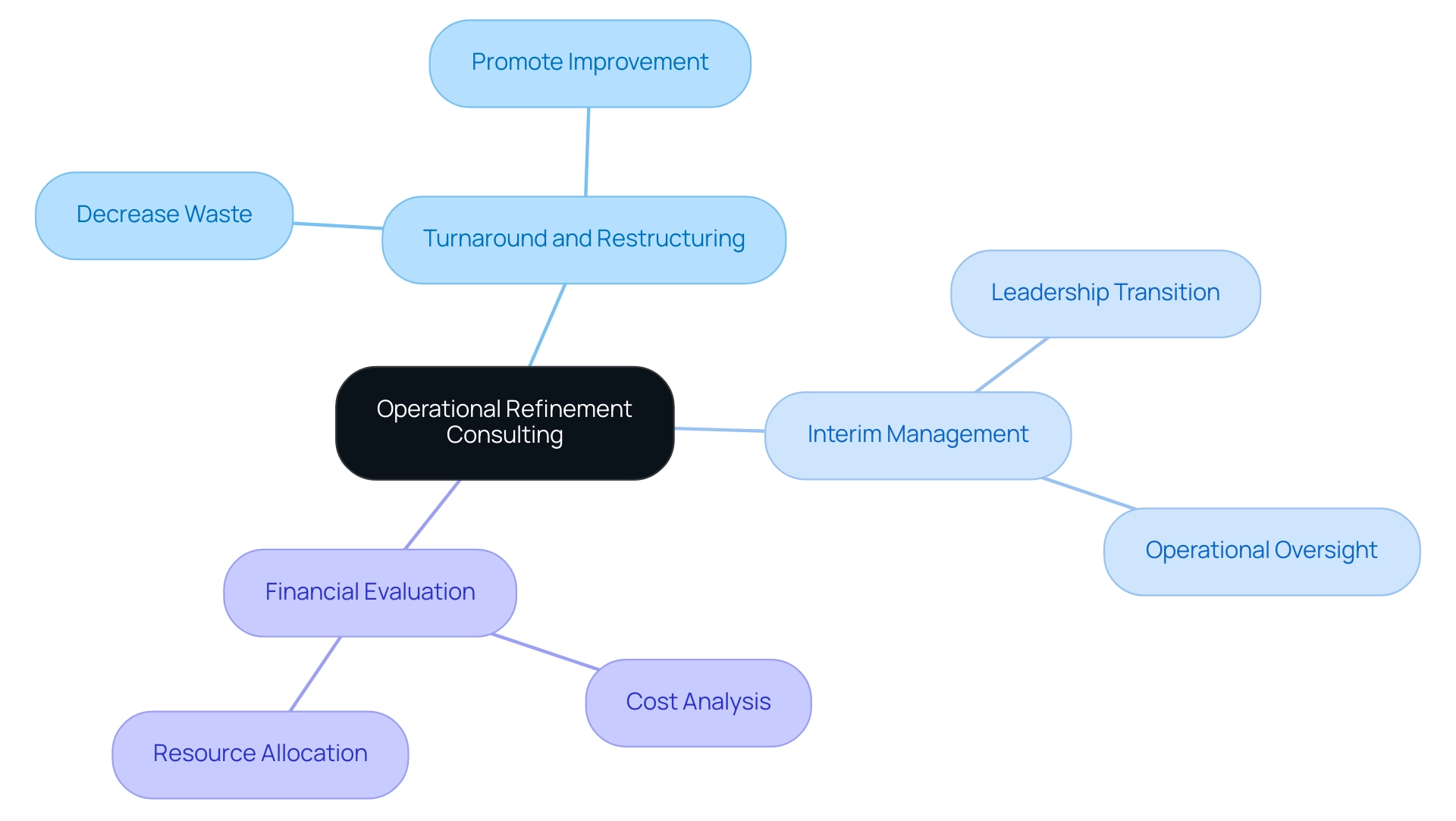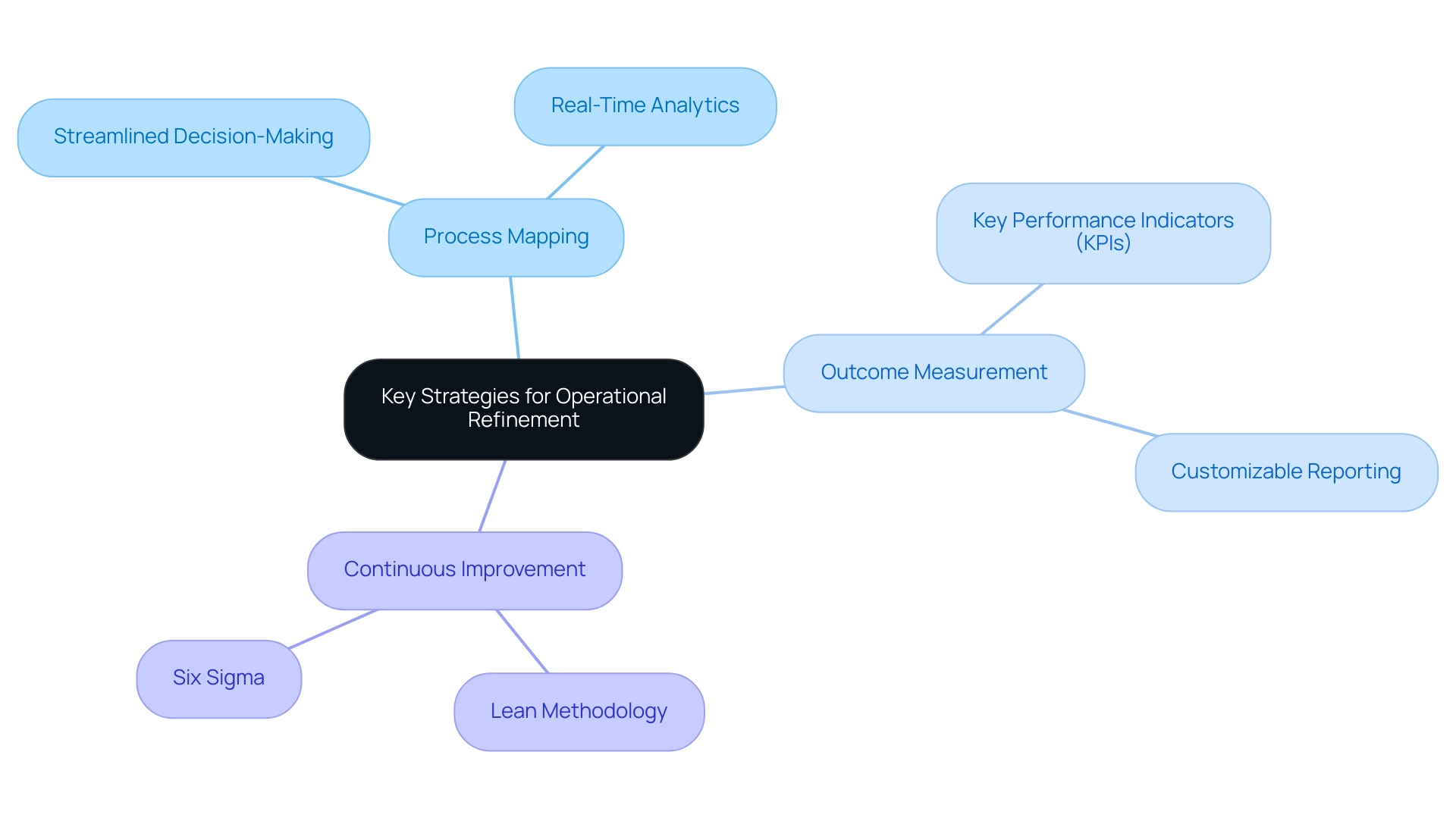Introduction
In the ever-evolving landscape of business, operational refinement consulting emerges as a crucial ally for organizations navigating complex transitions such as mergers, acquisitions, or restructuring. By meticulously analyzing existing processes and systems, this specialized advisory service identifies opportunities for enhancement that drive efficiency and effectiveness.
Emphasizing the role of digital transformation, the article explores how advanced technologies can significantly reduce operational costs while fostering innovation. It outlines key strategies:
- Process mapping
- Continuous improvement methodologies
These strategies empower organizations to achieve sustainable operational excellence. Furthermore, the importance of measuring impact through both quantitative and qualitative metrics is highlighted, ensuring that businesses remain aligned with their objectives and responsive to market dynamics.
This comprehensive approach not only enhances performance but also builds lasting partnerships, positioning organizations for long-term success.
Defining Operational Refinement Consulting
Operational refinement consulting serves as a specialized advisory service focused on enhancing the efficiency and effectiveness of a company's operations, especially during crucial transitions like mergers, acquisitions, or restructuring. Our approach involves a comprehensive analysis of existing processes, systems, and workflows to pinpoint areas for improvement. With an emphasis on operational refinement consulting, including:
- Thorough turnaround and restructuring
- Interim management
- Financial evaluation
we optimize operations, decrease waste, and promote overall improvement.
By leveraging our Rapid-30 process, we work collaboratively with entities to identify underlying business issues, implement best practices, and optimize resource allocation. Our technology-enabled solutions ensure real-time analytics for continuous performance monitoring, enabling businesses to achieve sustainable growth while fostering strong relationships built on transparency, results, and innovation. Our services ultimately help businesses save money, reduce overhead, and grow revenues.

The Role of Digital Transformation in Operational Refinement
Digital transformation is essential for operational refinement consulting, allowing organizations to harness advanced technologies that enhance efficiency and innovation. By adopting digital tools such as data analytics, automation, and cloud computing, companies can achieve a remarkable 15% to 20% reduction in operational costs. For instance, utilizing a unified analytics platform allows for a comprehensive view of both client and internal environments, delivering real-time insights that support informed decision-making and streamline the cash conversion cycle.
As Qas Bhatti, Sales Director for EMEA, points out, 'Consolidated analytics platforms can provide a holistic view of client and internal environments for a more comprehensive look at operations.' However, many manufacturers encounter obstacles in embracing digital transformation, including:
- Significant capital investments
- A traditional focus on physical products
- An inherent risk aversion
Integrated software systems further facilitate communication and collaboration across departments, reducing delays and improving responsiveness.
Furthermore, digital transformation establishes the groundwork for agile methodologies, which can be effectively executed through approaches outlined in our case study titled 'Methods for Achieving Operational Efficiency.' This encompasses:
- Self-assessment
- Cloud migration
- The deployment of AI solutions
These strategies allow organizations to swiftly adjust to changing market dynamics and customer needs. Specific approaches for mastering the cash conversion cycle include:
- Optimizing inventory management
- Improving receivables collection
- Extending payables without jeopardizing supplier relationships
Consultants in operational refinement consulting stress that utilizing digital approaches is essential for attaining lasting excellence, as noted by effective digital roadmaps. These approaches not only promote improved efficiency in operations but also enhance service delivery, reaffirming the essential role of technology in refining processes. Our consulting services are priced at $99.00, reflecting the worth of the insights and plans offered to assist your business's turnaround and progress tracking.
Key Strategies for Operational Refinement
Key strategies for operational refinement consulting include:
- Process mapping
- Outcome measurement
- Continuous improvement
All of which can be enhanced by:
- Streamlined decision-making
- Real-time analytics
Process mapping involves visually documenting workflows to identify inefficiencies and bottlenecks, allowing for targeted interventions. Evaluation measurement, through key performance indicators (KPIs), allows entities to monitor progress and evaluate the effectiveness of executed changes.
Our client dashboard not only provides real-time business analytics but also features customizable reporting and alert systems that enhance decision-making capabilities. This allows organizations to continually monitor their performance and health, operationalizing the lessons learned throughout the turnaround process. By committing to develop strong, lasting relationships with our clients, we ensure that these insights result in actionable plans.
Continuous improvement methodologies, such as Lean and Six Sigma, serve as frameworks for operational refinement consulting, ensuring that enhancements are sustained over time. By adopting these strategies, organizations can cultivate a culture of excellence that promotes long-term success while establishing strong relationships through continuous evaluation.

Measuring the Impact of Operational Refinement
Assessing the impact of process improvement necessitates a comprehensive analysis of both quantitative and qualitative metrics. Key success metrics (KPIs) typically include:
- Reductions in expenses
- Enhancements in productivity
- Improvements in customer satisfaction scores
For instance, entities can achieve significant cost reductions through strategic operational enhancements, with recent findings indicating that hospitals that implemented targeted interventions saw cost reductions of up to 15% over two years.
Our commitment to continuous business performance monitoring is fortified by real-time analytics provided through our client dashboard, which allows for ongoing diagnostics of business health and enables timely decision-making. Qualitative assessments—such as employee feedback and levels of stakeholder engagement—offer critical insights into the cultural and organizational shifts that accompany refinement initiatives. Regular reviews of these metrics are vital, allowing organizations to adapt strategies in real-time and ensure alignment with overarching business objectives.
As Georgieva Thompson Triggs emphasizes in her report to NHS England, 'effective consultation on service standards can significantly influence outcomes,' highlighting the necessity of stakeholder engagement in achieving successful enhancements. Additionally, insights from the case study on developing and evaluating complex interventions demonstrate that structured approaches to operational refinement consulting can lead to measurable improvements in health outcomes. By operationalizing the lessons learned throughout the turnaround process, we not only underscore the value of operational refinement consulting but also foster strong, lasting relationships and a culture of continuous improvement throughout the organization.
Conclusion
Operational refinement consulting stands as a pivotal resource for organizations aiming to thrive amid transitions such as mergers, acquisitions, or restructuring. By leveraging comprehensive analysis and digital transformation, businesses can unlock significant enhancements in efficiency and effectiveness. Key strategies, including process mapping and continuous improvement methodologies, serve as essential tools to identify inefficiencies and foster a culture of operational excellence.
The integration of advanced technologies not only facilitates substantial cost reductions—often between 15% to 20%—but also empowers organizations to respond swiftly to changing market conditions. Real-time analytics and performance measurement play critical roles in monitoring progress and ensuring that operational enhancements align with strategic objectives.
Ultimately, the journey toward operational refinement is not merely about immediate improvements; it is about cultivating long-term success and resilience. By committing to continuous performance monitoring and stakeholder engagement, organizations can adapt and thrive, ensuring that they remain competitive in an ever-evolving landscape. Embracing these principles positions businesses not only for immediate gains but also for sustainable growth and lasting partnerships.
Frequently Asked Questions
What is operational refinement consulting?
Operational refinement consulting is a specialized advisory service aimed at enhancing the efficiency and effectiveness of a company's operations, particularly during significant transitions such as mergers, acquisitions, or restructuring.
What are the key components of operational refinement consulting?
Key components include thorough turnaround and restructuring, interim management, and financial evaluation, all aimed at optimizing operations, reducing waste, and promoting overall improvement.
How does the Rapid-30 process work in operational refinement consulting?
The Rapid-30 process involves a collaborative effort to identify underlying business issues, implement best practices, and optimize resource allocation, supported by technology-enabled solutions for real-time analytics and continuous performance monitoring.
What role does digital transformation play in operational refinement consulting?
Digital transformation is crucial as it allows organizations to utilize advanced technologies like data analytics, automation, and cloud computing, leading to significant reductions in operational costs and improved decision-making.
What obstacles do manufacturers face in embracing digital transformation?
Manufacturers often encounter challenges such as significant capital investments, a traditional focus on physical products, and inherent risk aversion.
What strategies are recommended for mastering the cash conversion cycle?
Strategies include optimizing inventory management, improving receivables collection, and extending payables without jeopardizing supplier relationships.
What are the key strategies for operational refinement consulting?
Key strategies include process mapping, outcome measurement, and continuous improvement, which can enhance decision-making and real-time analytics.
How does process mapping contribute to operational refinement?
Process mapping visually documents workflows to identify inefficiencies and bottlenecks, allowing for targeted interventions to improve operations.
What metrics are used to assess the impact of process improvement?
Key success metrics include reductions in expenses, enhancements in productivity, and improvements in customer satisfaction scores.
How does the client dashboard aid in operational refinement?
The client dashboard provides real-time business analytics, customizable reporting, and alert systems, enabling organizations to monitor performance and operationalize lessons learned throughout the turnaround process.
What continuous improvement methodologies are utilized in operational refinement consulting?
Methodologies such as Lean and Six Sigma serve as frameworks to ensure that enhancements are sustained over time, fostering a culture of excellence within organizations.
Why is stakeholder engagement important in operational refinement consulting?
Stakeholder engagement is essential for achieving successful enhancements, as effective consultation on service standards can significantly influence outcomes and drive measurable improvements.




